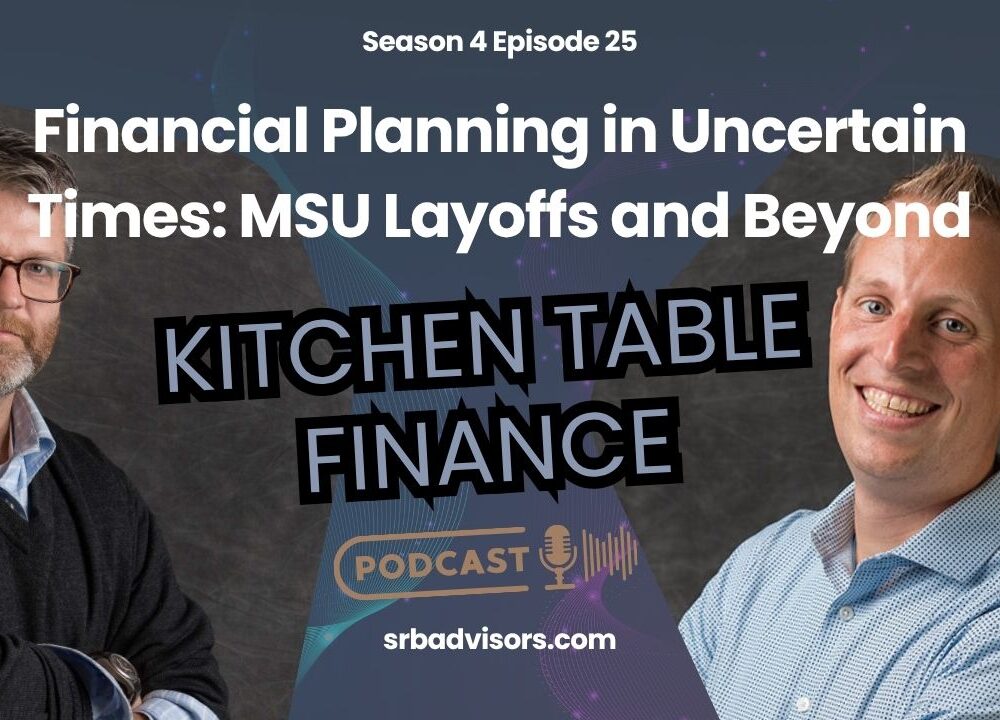How to Budget for Academic Year Faculty and Staff at MSU

Podcast: Play in new window | Download
Budgeting is hard enough for most people, but when you only get paid nine months out of the year, how do you manage your month-to-month expenses?
The trick is to budget for the summer during the rest of the year. You do this by building up a balance that you can use to see you through three months without a paycheck. This sounds simple enough, but in practice, we have found it proves difficult for some educators to implement.
Budgeting For the Entire Year with Seasonal Income
Here’s an approach that we think gets the job done:
- On paper or in a spreadsheet, list all your monthly expenses in the first column.
- In the second column list the actual monthly cost, or your best estimate for things like groceries and gasoline, etc. For expenses that you pay at odd intervals, like an insurance bill that you pay twice each year, convert the amount into a monthly expense by dividing it by the number of months in each interval.
- In the third column, multiply each of the monthly expenses by 12 to get the total for each expense for the year.
- In the fourth column, divide the annual number in column three by nine. This gives you the amount you must dedicate to each expense during the nine months you get paid to cover the three months in the summer when you don’t.
- In the fifth column, subtract the monthly expense (column 2) from the nine-month amount (column 3). This should give you the amount you need to set aside during the paycheck months.
- Total the fifth column. This is the total amount you need to save September through May to cover June, July, and August. This amount can now become a budget item, along with your normal expenses, during the rest of the year.
| Expense | Monthly | Annually | Nine Months | Difference |
| Mortgage | $1,000.00 | $12,000.00 | $1,333.00 | $333.00 |
| Phones | $150.00 | $1,800.00 | $200.00 | $50.00 |
| Internet | $100.00 | $1,200.00 | $133.00 | $33.00 |
| Monthly Savings Needed: | $416.00 |
Using Budgeting Software
This is a situation where budgeting software, such as You Need A Budget (YNAB), really shines.
- You can enter all your normal expenses with the actual monthly amounts for all twelve months of the year.
- Then add a budget category for “Summer Savings Need,” and enter the total need from the fifth column as the budget amount during your nine months with pay.
When summer rolls around, the funds will be there for you. If you don’t use a budget program that allows you to designate how you spend the money in your accounts, I would recommend opening a designated savings account to hold the funds you are setting aside for summer.
The above calculations work well if you are starting your savings plan in September and have the whole nine months to save for the following summer. If that’s not the case (life is never that simple, right?), then use the number of months left before summer to calculate what is needed.
For instance, if it is January and you are paid through the end of May, you need to divide the total in column four by five instead of nine to get what you need between now and summer. That may result in some unreasonable numbers. If that is the case, you need to re-prioritize your overall budget and make certain that basic expenses (your obligations like rent or your car payment) are covered.
What if Your Income is Less Predictable?
Teacher’s income may have twelve months’ salary lumped into nine months of pay, but what if your income is less predictable? Contractors and freelancers may have good months and bad months. Also, many salaried professionals get an annual bonus. In the bonus situation, we suggest budgeting for priority, fixed expenses out of a regular salary, and then using the bonus to catch up on savings goals or discretionary items like vacation funds.
If you don’t have a set salary and your income fluctuates from month to month, try to build a budget around a minimum average expected income. In months where income is higher, set money aside using the same principles outlined above to make sure you can cover expenses during slower months. The more irregular your income, the more important your budget becomes, as well as having a well-funded contingency fund.
Need More Help?
We are financial advisors and live to help people create workable budgets that provide for all of their needs based on their income, no matter how irregular or unpredictable it is. Give us a call today at 517-321-4832
About Shotwell Rutter Baer
Shotwell Rutter Baer is proud to be an independent, fee-only registered investment advisory firm. This means that we are only compensated by our clients for our knowledge and guidance — not from commissions by selling financial products. Our only motivation is to help you achieve financial freedom and peace of mind. By structuring our business this way we believe that many of the conflicts of interest that plague the financial services industry are eliminated. We work for our clients, period.
Click here to learn about the Strategic Reliable Blueprint, our financial plan process for your future.
Call us at 517-321-4832 for financial and retirement investing advice.
Share post:

